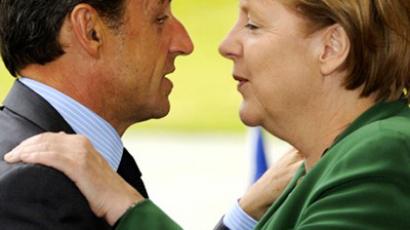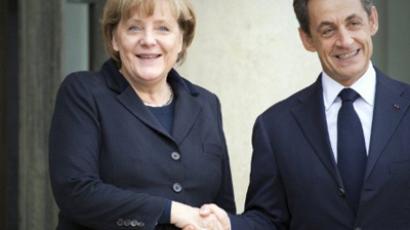Sticking europlaster: Merkel & Sarkozy press to speed up Greek solution
The French and German leaders have met in Berlin for the first time this year to discuss promoting economic growth, agreeing to sign a new “fiscal compact” and to reach an agreement on a financial transactions tax by March.
German Chancellor Angela Merkel hosted French President Nicolas Sarkozy, with whom she met on Monday to discuss ways to contain the Eurozone debt crisis. Greece was once again the main concern of their talks, with Merkel urging the conclusion of a debt restructuring agreement with Greek bondholders – a pact that requires bondholders to write off 50% of the Greek bonds’ value in return for a mix of cash and other bonds. The agreement is one precondition laid out for Greece if it hopes to receive a 130 billion-Euro bailout from the EU and the International Monetary Fund; another is an austerity program currently under development by technocrats in Lucas Papademos' government. “We must see progress on the voluntary restructuring of Greek debt,” Merkel told reporters at a news conference. “From our point of view, the second Greek aid package – including this restructuring – must be in place quickly. Otherwise it won't be possible to pay out the next tranche for Greece.”In the meantime an internal IMF memo, quoted by Der Spiegel on Saturday, said Greece's economic free-fall has made international lenders’ plans obsolete. Last month, European leaders agreed to create a new “fiscal compact” that would allow Brussels to take individual member states to court if they exceed a budget deficit of 3% of national GDP. Merkel and Sarkozy have agreed on a March 1 deadline for reaching such an agreement. Another important issue discussed was the introduction of a financial transactions tax, sometimes called the “Robin Hood tax.” This would impose a tax on various financial operations including individual share, derivative or bond purchases. President Sarkozy spoke in favor of the idea, and his government is expected to propose the measure to the National Assembly next month. Sarkozy justified the tax by saying that since banks helped create the current crisis, it should be they – not taxpayers – who foot the bill. Merkel has also spoken in favor of the measure, but has said that she would only accept it once the rest of the Eurozone does as well. “Both Germany and France, Nicolas Sarkozy and I, consider a transaction tax the right answer, and we will continue to campaign for it,” Merkel said during the press conference after the meeting, emphasizing that finance ministers from other EU countries should deliver their verdict on the measure by March.Some analysts have argued that Sarkozy is rushing the tax, which he describes as a public interest measure, in order to boost his chances of reelection. The United Kingdom has been a vocal opponent of the financial transaction tax being imposed only on national or regional levels, saying it would only give way to the measure if it is introduced globally. Merkel and Sarkozy also agreed to launch the 500 billion-Euro European Stability Mechanism, the EU’s permanent rescue fund, by July 2012, as Europe's existing 440 billion-Euro fund is considered too weak to rescue a major economy like Italy or Spain.Further, Merkel and Sarkozy said that austerity measures were not the only way to get Europe out of a crisis. “Budget consolidation is one of the legs Europe’s future must be built on, but of course we need a second leg and that is … the question of economic growth, jobs and employment,” Merkel told reporters. They proposed using already-available European funding to support small and medium-sized companies and projects like expanding broadband Internet networks. Germany’s economy appeared surprisingly strong in contrast to the debt-ridden southern European nations on the eve of the Berlin meeting. Germany has managed to sell 3.9 billion Euros' worth of six-month treasury bills carrying a negative interest rate – meaning investors are willing to lose some of their money to make sure the rest of it is stored in secure German bonds. Patrick Young, the executive director of the investment advisory firm “DV Advisors,” believes Monday’s meeting did not produce any concrete solutions. “The truth is that absolutely nothing has been done in order to try and actually fundamentally affect the problem,” he told RT. “And again, today what we’ve seen is a sticking plaster applied to all of the different problems that are going on. Mrs. Merkel saying, 'oh we’d like to keep everybody in the Euro, we hope to keep everything together, we work very hard to do that.' Well, you know what – the problem is not how much you talk about it, it’s actions that count. At the moment, all we have is words.”Young also spoke about the different aims of the French and German leaders. “Mr. Sarkozy is willing to burn the European Union in the pyre of his reelection efforts,” he said. “And that, therefore, leaves him fundamentally at right angles to Germany’s position, which is apparently to try and provide some sort of long-term solution.”Eppink also spoke about Sarkozy’s and Merkel’s differing agendas. “They have totally different agendas. In fact the big problem is in France, the French banks have a debt of 250 percent of GDP combined, and the French want to have German money to save their banks. And basically the French social model is in peril and in danger and they want Germany to save it and the other countries in Europe," he said. "The French are pushing the Germans to accept it their way, and to have the Eurozone under their conditions… [Germany] is increasing its clout, you see that in this pact, which is cherishing basically German budgetary principles. But then, in Germany, there is sort of this unease in Europe by say, you know, we cannot protest too much, we cannot be too harsh because we lost the war, and we have a sort of a common guilt and that is why the Germans are economically very strong, but mentally quite weak.”














